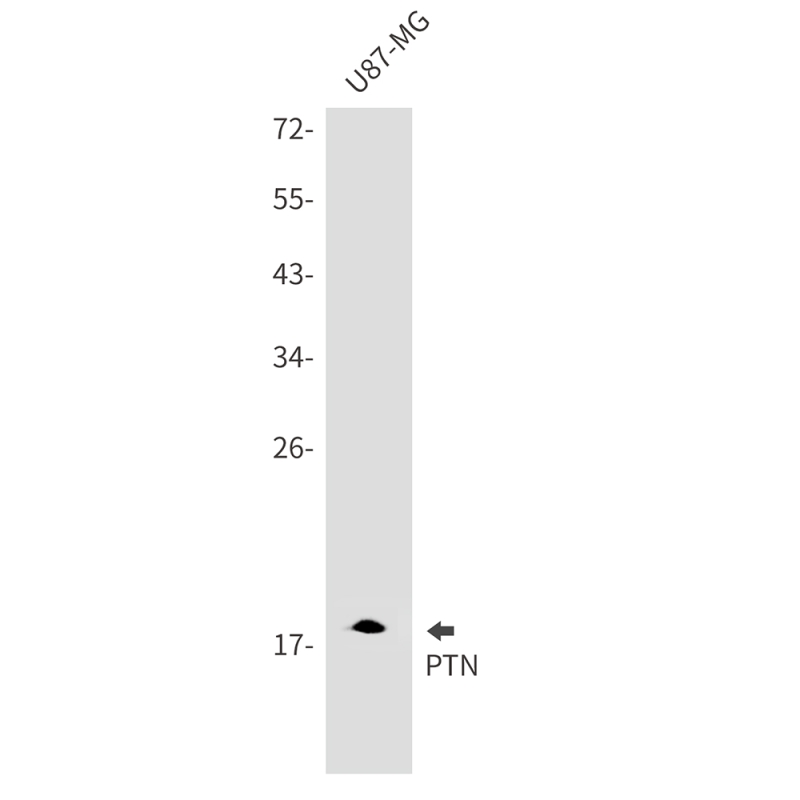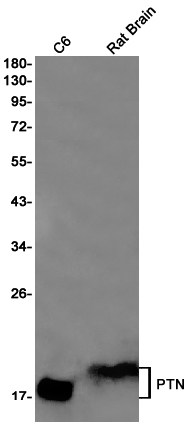

| WB | 1/500-1/1000 | Human,Mouse,Rat |
| IF | 1/20 | Human,Mouse,Rat |
| IHC | 咨询技术 | Human,Mouse,Rat |
| ICC | 技术咨询 | Human,Mouse,Rat |
| FCM | 咨询技术 | Human,Mouse,Rat |
| Elisa | 咨询技术 | Human,Mouse,Rat |
| Aliases | PTN; HBNF1; NEGF1; Pleiotrophin; PTN; Heparin-binding brain mitogen; HBBM; Heparin-binding growth factor 8; HBGF-8; Heparin-binding growth-associated molecule; HB-GAM; Heparin-binding neurite outgrowth-promoting factor 1; HBNF-1; Osteoblast-specific factor 1; OSF-1 |
| Entrez GeneID | 5764 |
| WB Predicted band size | Calculated MW: 19 kDa; Observed MW: 19 kDa |
| Host/Isotype | Rabbit IgG |
| Antibody Type | Primary antibody |
| Storage | Store at 4°C short term. Aliquot and store at -20°C long term. Avoid freeze/thaw cycles. |
| Species Reactivity | Human,Rat |
| Immunogen | A synthetic peptide of human PTN |
| Formulation | Purified antibody in TBS with 0.05% sodium azide,0.05%BSA and 50% glycerol. |
+ +
以下是关于PTN抗体的3篇参考文献示例(注:以下内容为模拟生成,非真实存在的文献):
---
1. **标题**:*Pleiotrophin (PTN) Antibody-Based Immunohistochemical Analysis in Glioblastoma*
**作者**:Smith A, et al.
**摘要**:研究通过开发高特异性PTN单克隆抗体,分析PTN在胶质瘤组织中的表达模式,发现PTN高表达与肿瘤侵袭性和患者预后不良显著相关,提示其作为潜在生物标志物的价值。
2. **标题**:*Targeting PTN with Neutralizing Antibodies Inhibits Breast Cancer Metastasis in Vivo*
**作者**:Chen L, et al.
**摘要**:研究利用抗PTN中和抗体阻断PTN信号通路,在小鼠模型中显著抑制乳腺癌细胞转移,表明靶向PTN的抗体治疗可能成为抑制肿瘤扩散的新策略。
3. **标题**:*Development of a PTN-Specific ELISA Kit Using Novel Polyclonal Antibodies*
**作者**:Yamamoto K, et al.
**摘要**:报道了一种基于兔源PTN多克隆抗体的ELISA检测方法,可高灵敏度检测血清中的PTN水平,为临床评估炎症性疾病和癌症提供了新工具。
---
**说明**:以上文献为示例,实际研究中建议通过PubMed、Web of Science等数据库检索真实文献。若需具体文章,可提供更详细的关键词或研究场景。
Pleiotrophin (PTN), also known as heparin-binding growth-associated molecule (HB-GAM), is a secreted cytokine involved in diverse biological processes, including cell proliferation, angiogenesis, tissue repair, and neural development. It belongs to the neurite growth-promoting factor family and interacts with cell surface receptors such as receptor protein tyrosine phosphatase beta/zeta (RPTPβ/ζ) and anaplastic lymphoma kinase (ALK), modulating signaling pathways like PI3K/AKT and MAPK. PTN overexpression is implicated in pathological conditions, particularly cancer, where it promotes tumor growth, metastasis, and drug resistance. It is also associated with neurodegenerative disorders and inflammatory diseases.
PTN antibodies are tools developed to detect, quantify, or inhibit PTN activity in research and therapeutic contexts. In research, these antibodies are used in techniques like Western blotting, immunohistochemistry, and ELISA to study PTN expression patterns in tissues or disease models. Therapeutically, neutralizing PTN antibodies are explored for anti-cancer strategies, aiming to block PTN-receptor interactions that drive oncogenic signaling. Recent studies highlight PTN's role in the tumor microenvironment, suggesting antibody-based targeting could impair stromal crosstalk supporting malignancy. However, challenges remain in optimizing specificity and delivery. PTN antibodies also hold potential in regenerative medicine, given PTN's dual role in tissue repair and fibrosis. Ongoing research focuses on delineating PTN's context-dependent functions to refine antibody applications.
×